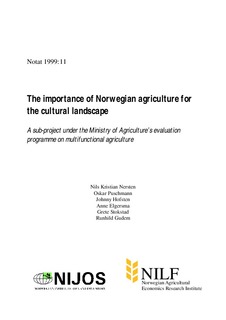The importance of Norwegian agriculture for the cultural landscape. A sub-project under the Ministry of Agriculture’s evaluation programme on multifunctional agriculture
Nersten, Nils Kristian; Puschmann, Oskar; Hofsten, Johnny; Elgersma, Anne; Stokstad, Grete; Gudem, Runhild
Research report
Permanent lenke
http://hdl.handle.net/11250/2499572Utgivelsesdato
1999Metadata
Vis full innførselSamlinger
- NIJOS dokument [42]
Sammendrag
The World Trade Organization (WTO) will initiate negotiations on the further liberalization of the global trade with agricultural commodities by the end of 1999. These negotiations are basedon Article 20 of the Uruguay Round’s Agreement on Agriculture, which states, inter alia, that the reform process is to be continued, with the long-term objective of substantial and progressive reductions in the support and protection of the agricultural sector. In this context, however, a number of issues are to be taken into consideration, including the so-called non-trade concerns. The Norwegian authorities have started preparations for the new round of WTO negotiations, and have placed substantial emphasis on the non-trade concerns. Norwegian agriculture is regarded as being a ”producer” of more than just food and fibres, for example, national food security, viable rural areas and environmental benefits. The term ”Multifunctional Agriculture” is being increasingly applied to describe these additional functions1. With regard to Norwegian agriculture, it will be of major importance for Norway that sufficient consideration is given to the non-trade and other concerns during the next round of the WTO negotiations. In the summer/fall of 1998, the Norwegian Ministry of Agriculture initialized an evaluation program in order to survey and analyse a number of issues in relation to ”multifunctional agriculture”. The present report is one of the contributions in this context.
